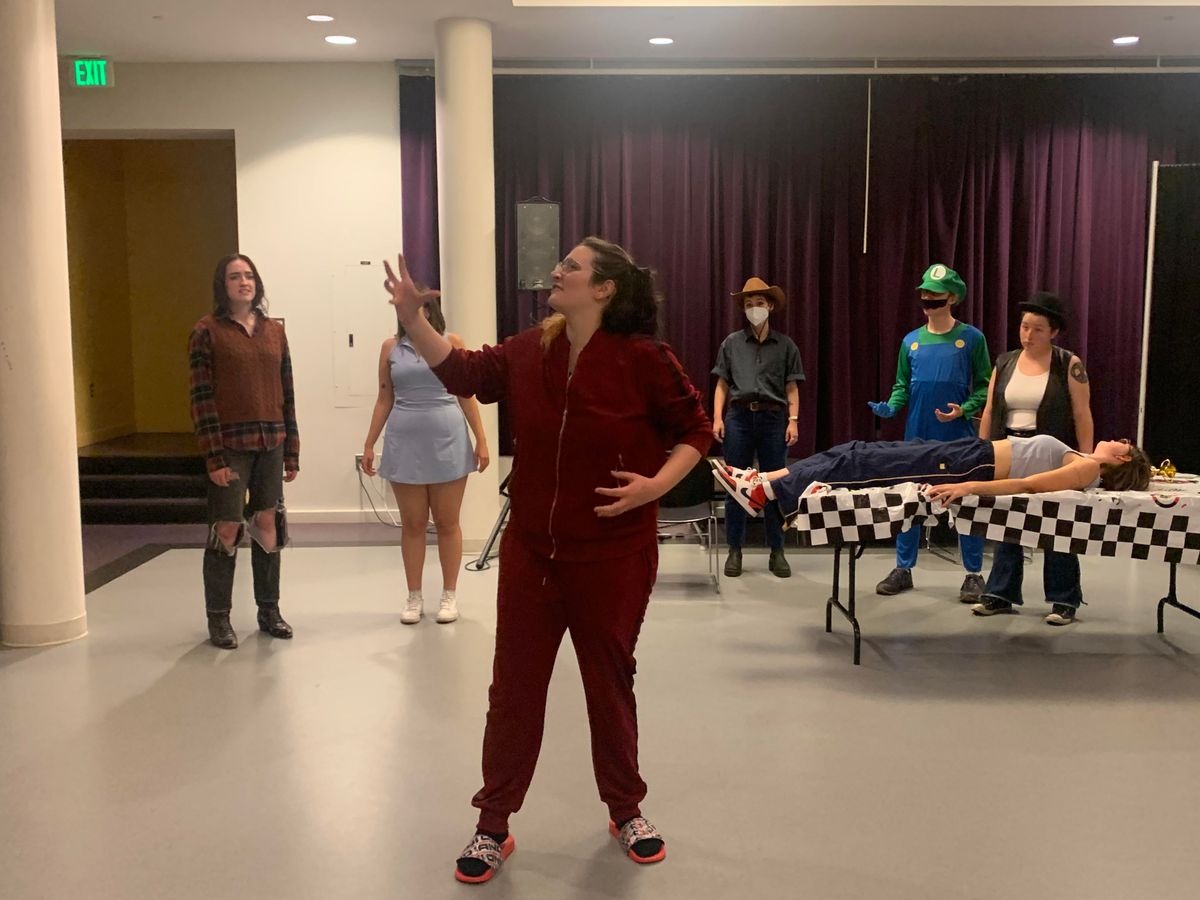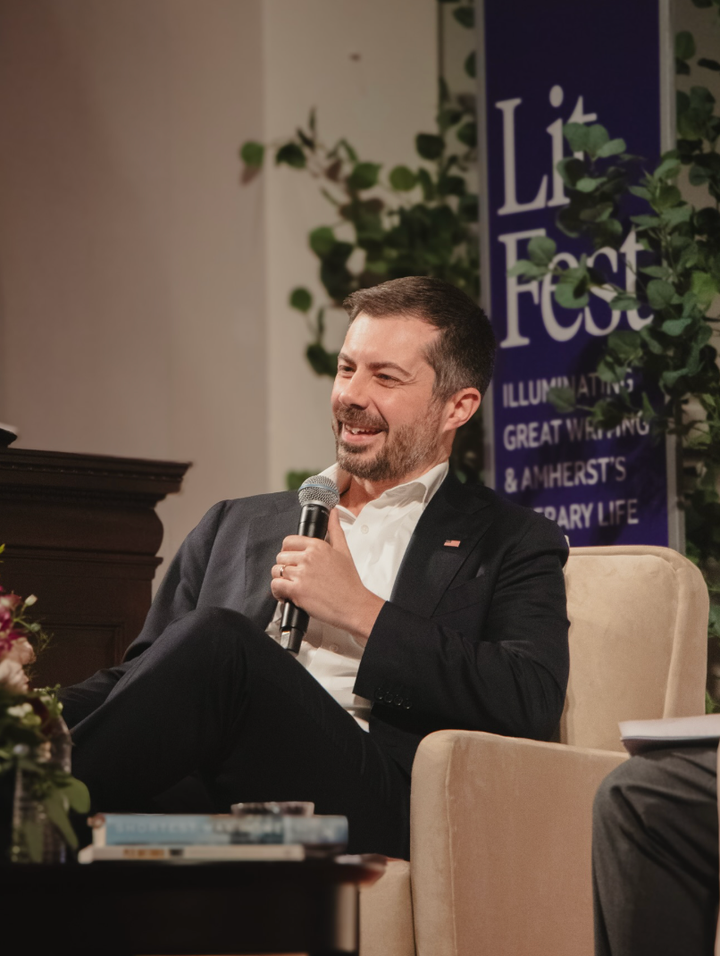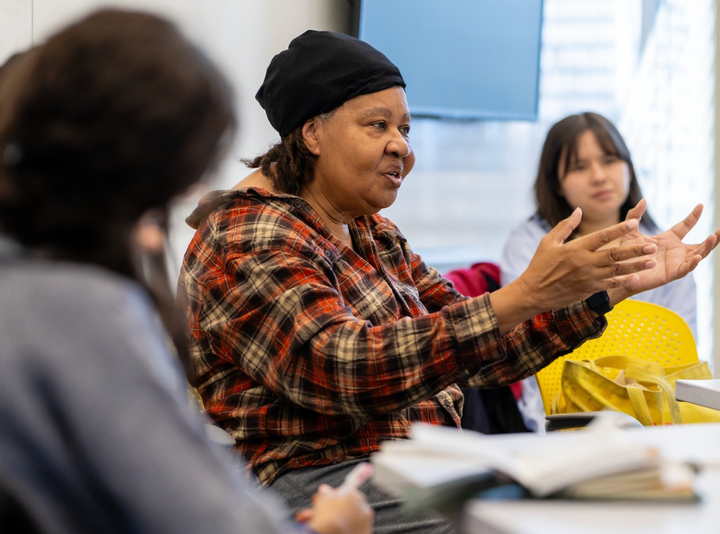Green Room’s “Cars: A Parody”: Kachow!
Green Room’s first production of the semester, “Cars: A Parody,” debuted on Oct. 21. Assistant Arts and Living Editor Noor Rahman ’25 reviews the show, noting the talent of the cast and the wit of the writing.

The weekend of Oct. 21-23 was an exciting one for the many “Cars” fans at Amherst: The Green Room student theater club performed its first show of the semester, “Cars: A Parody.” As a lifelong fan of the original “Cars” franchise, I had high expectations for the performance — and Green Room did not disappoint. The mixture of faithfulness to the original film and the creation of a new identity was perfectly balanced. It was an experience that was both nostalgic and enthralling, leaving me with nothing to say but “kach-wow!”
The idea for the “Cars” parody began several years ago as an amusing hypothetical. Each year, Green Room writes and performs an original parody of a franchise, and the group knew that it was time to act when the idea of “Cars” was brought up again during this year’s parody planning discussions.
Once the parody had been picked, the writing process began. Led by Shay Hernandez ’23, the writers started by watching the original “Cars” film together. Each writer was then assigned to write certain scenes, and the editing process ensured that a cohesive narrative developed.
The show explores the theme of graceful aging. Hotshot race car Lightning McQueen (Lily Brenner ’26) relentlessly pushes his body, training harder to win races but refusing to acknowledge that he might hurt himself in the long-term. In a key divergence from the original film, Doc Hudson (Reina Corcoran ’23), grumpy-but-loving elder no longer, is an organ-harvesting cult leader. He murders the cars who have the misfortune of driving through Radiator Springs in order to implant their parts into himself to achieve immortality. He manipulates various other cars into participating in these murders, such as the Sheriff (Sarah Boyle ’26) and Luigi (Teddy Stephens ’26).
Sally (Isabelle Anderson ’25) is no longer a city Porsche with a newfound penchant for small-town life, but instead an undercover spy intent on revealing the misdeeds of Doc and his associates. In a refreshing departure from the movie cliché that every male-female friendship evolves into romance, Sally’s role as McQueen’s love interest is altered as well. Instead, both Sally and McQueen find themselves in love with Mater (Ella Rose ’23), who hilariously (and accidentally) friend-zones both of them.
Perhaps the single most important metric of success of a parody is its ability to make the audience laugh. In this regard, “Cars: A Parody” was certainly successful. The show was funny all the way through, at times sophisticated and at times absurd in its humor. The performers poked fun at the original film — why, indeed, do the cars have tongues? — and satirized the American healthcare system.
In a memorable yet ingeniously simple scene, Chick Hicks (Erin Williams ’26) ran about the stage yelling “Bang! Bang!” repeatedly. (Hicks was promoting his racing sponsor, the energy drink “Bang Energy.”) The absurdity of Williams running around screaming elicited laughs from the entire audience. Williams’ acting chops are not to be understated; the ability to turn a simple concept with only one line of dialogue into comedic gold is impressive.
But the subtle, human-focused, contemporary themes are what set the show over the edge. Rust-eze, McQueen’s racing sponsor, was bumper ointment in the original film. It was adapted to human actors by being a skin care product instead. Dynaco was the highly coveted sponsor in the original; it is Amazon Prime in the parody. These subtle changes created a shared culture between the actors on the stage and the audience — the thoughtfulness apparent in these numerous details was striking.
A review of the production would not be complete without acknowledging the range of acting talent on display in the show. Corcoran’s portrayal of Doc was incredible, perhaps my favorite aspect of the show. They captured the machismo of a midwestern cowboy, the irreverence of a murderous cult leader, and the growth of a character who is forced to confront his mortality. With each step they took across the stage, each smirk leveled at another character, they perfectly captured the spirit of the cult leader. This feat was especially impressive considering that, more than for any other character, the parody’s Doc was a complete departure from the original film.
Brenner’s satirical portrayal of a Gen Z-inspired McQueen injected a dose of light-hearted wit. She mastered the art of saying “kachow” with just the right body language and intonation to convey a specific meaning. Rose’s Mater was brilliantly true to the original. The happy-go-lucky, carefree tow truck was seamlessly transformed into human form through Rose. And Anderson’s Sally contained the same audacity of spirit that made her original character iconic. But she also gave Sally agency and an independent voice which had been lacking in the original film.
Above all else, the show had an air of fun to it. The actors clearly enjoyed the performance at least as much as the audience did. As Ella Vacchi ’23, a member of the directorial team, remarked, “If it looks like the actors were having fun on stage, they were having 10 times more fun than it seemed.”





Comments ()